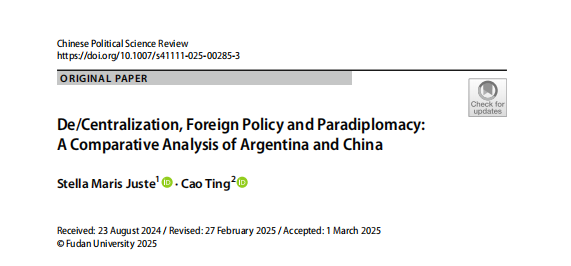Author:Stella Maris Juste,Cao Ting Release date:2025-04-01 14:04:16Source:Chinese Political Science Review

Introduction
Argentina and China are organized politically and administratively as federal and unitary states respectively. In both cases, participation of the provinces in foreign policy through paradiplomacy is relevant. This article aims to analyze the relationship between decentralization/centralization of the state, foreign policy, and paradiplomacy in Argentina and China. In this context, the following research questions arise: How does de/centralization influence the multi-level articulation between the state and its subnational units? How does de/centralization affect the mechanisms of articulation between national foreign policy and subnational paradiplomacy? The intention is to analyze the articulation between the subnational and national levels in relation to paradiplomatic action and foreign policy-making.
Methods
The theoretical approach employs theories on decentralization and centralization in unitary and federal political systems; alongside studies on paradiplomacy and territorial internationalization. The methodology is a qualitative comparative case study in which the provinces of Jujuy (Argentina) and the city of Shanghai (China) are studied from 2013 to 2023.
Results
Whether a state follows a model of federal or unitary organization does not necessarily define the level of functional decentralization. Higher levels of decentralization are observed in China’s unitary system because its reforms gave Chinese provinces major responsibility for local management (in fields including the economy, education, health, and others). In contrast, despite adopting a decentralized system, functions in Argentina are largely centralized at the national level.
Conclusion
As a result, a state’s form of organization as a federal or unitary system does not necessarily respectively imply decentralization or centralization. Instead, greater or lesser functional articulation between subnational and national levels can promote a system which incorporates the development interests of all actors involved. In the international arena, the articulation between the state’s foreign policy and the paradiplomacy of subnational units enables coherent and concrete actions that take advantage of the opportunities of the context to further national development.
Key Words
De/centralization,Foreign policy,Paradiplomacy,Argentina,China
Link for Full Paper
https://link.springer.com/article/10.1007/s41111-025-00285-3
Authors
Stella Maris Juste
National Scientific and Technical Research Council (Consejo Nacional de Investigaciones
Científicas y Técnicas, CONICET) and National University of Jujuy, Argentina
Visiting scholar of Fudan Development Institute
Cao Ting(Corresponding author)
Research Office for Latin American Studies, Fudan University